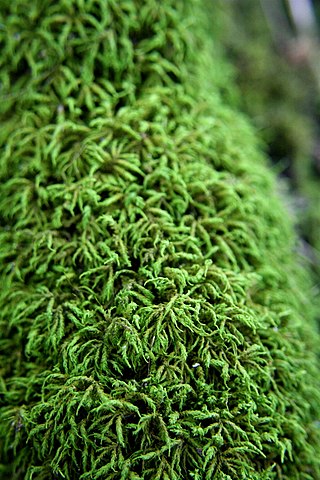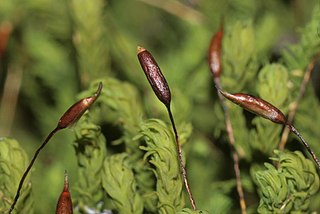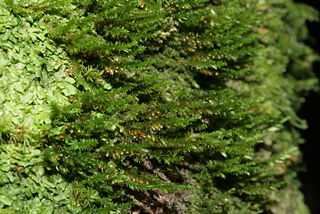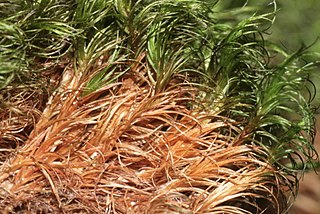
Gymnostomum is a genus of bryophyte in family Pottiaceae. It was first described by Christian Gottfried Daniel Nees von Esenbeck and Christian Friedrich Hornschuch

Entodon seductrix, known as the seductive entodon moss or round-stem silk moss, is a species of Entodontaceae.

Anomodon is a genus of mosses in the family Thuidiaceae.

Pogonatum is a genus of mosses — commonly called spike moss — which contains approximately 70 species that cover a cosmopolitan distribution. It can be seen mostly in Asian countries with a tropical climate.

Barbula is a genus of mosses in the family Pottiaceae.

Racomitrium is a genus of mosses in the family Grimmiaceae established in 1818 by Samuel Elisée Bridel-Brideri. It contains the following species:

Cryphaea is a genus of mosses, (Bryophyta), containing at least 26 accepted species.

Campylopus is a genus of 180 species of haplolepideous mosses (Dicranidae) in the family Leucobryaceae. The name comes from the Greek campylos, meaning curved, and pous, meaning foot, referring to the setae which curve downwards.

Thuidium is a genus of moss in the family Thuidiaceae. The name comes from the genus Thuja and the Latin suffix -idium, meaning diminutive. This is due to its resemblance to small cedar trees.

Didymodon is a genus of mosses belonging to the family Pottiaceae. The genus has a cosmopolitan distribution.

Plagiothecium is a genus of moss belonging to the family Plagiotheciaceae. It has a cosmopolitan distribution.

Rhynchostegium is a genus of pleurocarpous mosses belonging to the family Brachytheciaceae. The genus has a cosmopolitan distribution across different climatological regions except the polar regions, mostly in tropic to north temperate regions. The genus contains both aquatic and terrestrial species. The genus was named for their rostrate opercula. The type species of this genus is Rhynchostegium confertum (Dicks.) Schimp.

Homalothecium is a genus of mosses belonging to the family Brachytheciaceae.

Rhizogonium is a genus of mosses belonging to the family Rhizogoniaceae.
Pylaisia is a genus of mosses belonging to the family Pylaisiaceae.
Platygyrium is a genus of mosses belonging to the family Hypnaceae.
Orthothecium is a genus of mosses belonging to the family Hypnaceae.
Heterocladium is a genus of mosses belonging to the family Thuidiaceae.
Entodontaceae is a family of mosses belonging to the order Hypnales.













